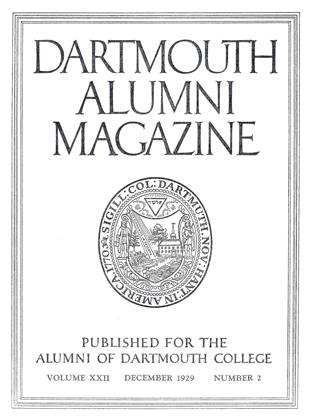The following article appeared recently in the Princeton Alumni Weekly under the title: "Revolving Stadium." It has found supporters among the residents of Hanover and is reprinted below:
In the fall of the year residents of Princeton are always deluged with requests for football tickets. Every such resident is popularly supposed to have plenty of time on his hands, a drag with the Athletic Association, and a keen personal interest in where their friends' customers are seated when the whistle blows in the Stadium. Also he is supposed to have plenty of money, for no requester of tickets has ever been known to accompany his request with a check, although he knows that tickets are sold only for cash. However, the resident usually tries to oblige, and sometimes, after dint of much time and trouble, he succeeds. He mails the tickets to his friend, and a belated letter of acknowledgment (with no check enclosed) thanks him for "those two rotten seats."
Few people, of course, are ever satisfied with their football tickets. The problem is a pressing one each fall, and no constructive solution of it has ever been offered,—that is up until this moment. To correct this situation I offer the world, through you, my plan for a revolving stadium; the idea is not patented, nor are there any strings attached.
Briefly, the plan is to build a stadium, probably it would have to be a bowl,—on wheels, the wheels to rest on tracks. When the game begins the stadium, or bowl, starts to revolve. It revolves slowly, making only one complete revolution during the course of the game. You see the idea? You may start out behind the north goal-line, and when you get through you will be back where you started. During the course of the game, however, you will twice have been sitting on the fiftyyard line, perhaps you will have been right on the goal line when the winning touchdown was made. In any event,—aside from the chance of being in the wrong place at the right time, a chance shared by all your fellow spectators,—you will have just as good a seat as anybody; no one will be favored, but all treated exactly alike. There will no longer be any "rotten seats." There will no longer be any choice of seats, and just think what that would mean to the Athletic Association; and to the residents of Princeton; it might even mean something to the spectators.
There are other advantages of this scheme, but I know your space is valuable. The only disadvantage I can think of is to the man who arrives late; he may find that his seat in 13 has gotten around to the south stand, or that instead of entering gate 5, he would have done better to have used 2. But these are only details to be worked out, after all.
T. G. P.
Princeton, N. J., October 25, 1929.
 View Full Issue
View Full Issue
More From This Issue
-
 Class Notes
Class NotesCLASS OF 1923
December 1929 By Truman T. Metzel -
 Article
ArticleAlumni Associations
December 1929 -
 Article
ArticleAlumni Council Meets in New York
December 1929 -
 Article
ArticleCarnegie Report
December 1929 -
 Article
ArticleThe Dartmouth Indians
December 1929 By Eric P. Kelly -
 Sports
SportsThe Yale Epic
December 1929 By Phil Sherman
Article
-
 Article
ArticleGridiron Fever
November 1938 -
 Article
ArticleLloyd D. Brace '25 Begins A Full Term As Alumni Trustee
July 1955 -
 Article
ArticleThe College
FEBRUARY 1970 -
 Article
ArticleSunbathing Near The Shah
MARCH 1992 -
 Article
ArticleClassnotes
JANUARY | FEBRUARY 2014 By DARTMOUTH COLLEGE LIBRARY -
 Article
ArticleThe Starting Point
OCTOBER, 1908 By Ernest Martin Hopkins '01

